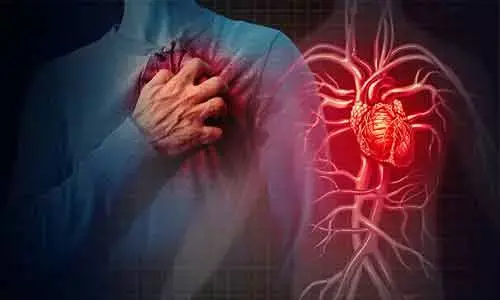- Home
- Medical news & Guidelines
- Anesthesiology
- Cardiology and CTVS
- Critical Care
- Dentistry
- Dermatology
- Diabetes and Endocrinology
- ENT
- Gastroenterology
- Medicine
- Nephrology
- Neurology
- Obstretics-Gynaecology
- Oncology
- Ophthalmology
- Orthopaedics
- Pediatrics-Neonatology
- Psychiatry
- Pulmonology
- Radiology
- Surgery
- Urology
- Laboratory Medicine
- Diet
- Nursing
- Paramedical
- Physiotherapy
- Health news
- Fact Check
- Bone Health Fact Check
- Brain Health Fact Check
- Cancer Related Fact Check
- Child Care Fact Check
- Dental and oral health fact check
- Diabetes and metabolic health fact check
- Diet and Nutrition Fact Check
- Eye and ENT Care Fact Check
- Fitness fact check
- Gut health fact check
- Heart health fact check
- Kidney health fact check
- Medical education fact check
- Men's health fact check
- Respiratory fact check
- Skin and hair care fact check
- Vaccine and Immunization fact check
- Women's health fact check
- AYUSH
- State News
- Andaman and Nicobar Islands
- Andhra Pradesh
- Arunachal Pradesh
- Assam
- Bihar
- Chandigarh
- Chattisgarh
- Dadra and Nagar Haveli
- Daman and Diu
- Delhi
- Goa
- Gujarat
- Haryana
- Himachal Pradesh
- Jammu & Kashmir
- Jharkhand
- Karnataka
- Kerala
- Ladakh
- Lakshadweep
- Madhya Pradesh
- Maharashtra
- Manipur
- Meghalaya
- Mizoram
- Nagaland
- Odisha
- Puducherry
- Punjab
- Rajasthan
- Sikkim
- Tamil Nadu
- Telangana
- Tripura
- Uttar Pradesh
- Uttrakhand
- West Bengal
- Medical Education
- Industry
Heart attack diagnosis missed in women more often than in men, says study

Chest pain is misdiagnosed in women more frequently than in men, according to research presented today at ESC Acute CardioVascular Care 2021, an online scientific congress of the European Society of Cardiology (ESC).1 The study also found that women with chest pain were more likely than men to wait over 12 hours before seeking medical help.
"Our findings suggest a gender gap in the first evaluation of chest pain, with the likelihood of heart attack being underestimated in women," said study author Dr. Gemma Martinez-Nadal of the Hospital Clinic of Barcelona, Spain. "The low suspicion of heart attack occurs in both women themselves and in physicians, leading to higher risks of late diagnosis and misdiagnosis."
This study examined gender differences in the presentation, diagnosis, and management of patients admitted with chest pain to the chest pain unit of an emergency department between 2008 and 2019. Information was collected on risk factors for a heart attack including high blood pressure and obesity. The researchers recorded the physician's initial diagnosis after the first evaluation of each patient, which is based on clinical history, physical examination, and an electrocardiogram (ECG) and occurs before other examinations like blood tests.
"We had the first impression of the doctor as to whether the chest pain had a coronary cause or another origin such as anxiety or a musculoskeletal complaint," explained Dr. Martinez-Nadal.
A total of 41,828 patients with chest pain were included, of which 42% were women. The median age was 65 years in women and 59 years in men. Women were significantly more likely to present late to the hospital (defined as waiting 12 hours or longer after symptom onset): this occurred in 41% of women compared to 37% of men.
"This is worrying since chest pain is the main symptom of reduced blood flow to the heart (ischaemia) because an artery has narrowed," said Dr. Martinez-Nadal. "It can lead to a myocardial infarction which needs rapid treatment."
In the physician's initial diagnosis, acute coronary syndrome was more likely to be considered the cause of chest pain in men compared to women. Specifically, in 93% of patients, the ECG did not provide a definitive diagnosis. In those patients, the doctor noted a probable acute coronary syndrome (ACS) in 42% of cases - when analysed according to gender, probable ACS was noted in 39% of women and 44.5% of men (p<0.001). The significantly lower suspicion of ACS in females was maintained regardless of the number of risk factors or the presence of typical chest pain.
Dr. Martinez-Nadal said: "In the doctor's first impression, women were more likely than men to be suspected of a non-ischaemic problem. Risk factors like hypertension and smoking should instil a higher suspicion of possible ischaemia in patients with chest pain. But we observed that women with risk factors were still less likely than men to be classified as 'probable ischaemia'."
In women, 5% of ACS were initially misdiagnosed, whereas in men, 3% of ACS were initially misdiagnosed (p<0.001). After multivariate analysis, female gender was an independent risk factor for an initial impression of non-ACS.
Dr. Martinez-Nadal said: "Heart attack has traditionally been considered a male disease, and has been understudied, underdiagnosed, and undertreated in women, who may attribute symptoms to stress or anxiety. Both women and men with chest pain should seek medical help urgently."
Hina Zahid Joined Medical Dialogue in 2017 with a passion to work as a Reporter. She coordinates with various national and international journals and association and covers all the stories related to Medical guidelines, Medical Journals, rare medical surgeries as well as all the updates in the medical field. Email: editorial@medicaldialogues.in. Contact no. 011-43720751
Dr Kamal Kant Kohli-MBBS, DTCD- a chest specialist with more than 30 years of practice and a flair for writing clinical articles, Dr Kamal Kant Kohli joined Medical Dialogues as a Chief Editor of Medical News. Besides writing articles, as an editor, he proofreads and verifies all the medical content published on Medical Dialogues including those coming from journals, studies,medical conferences,guidelines etc. Email: drkohli@medicaldialogues.in. Contact no. 011-43720751


